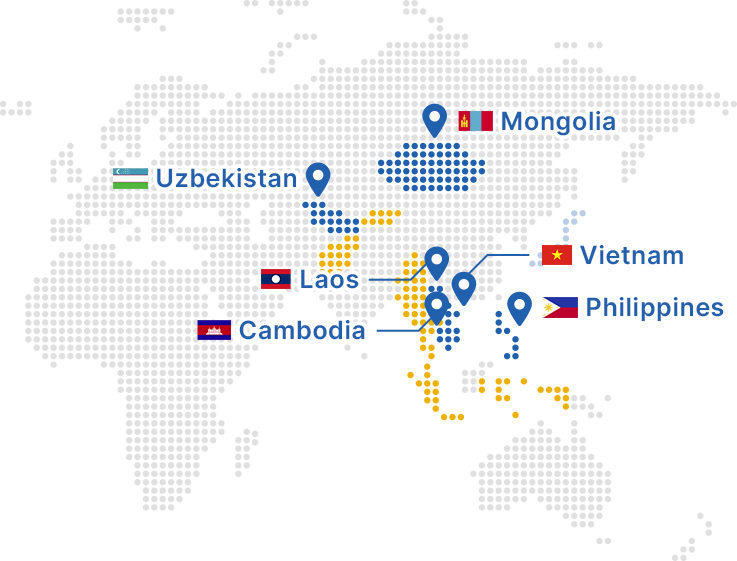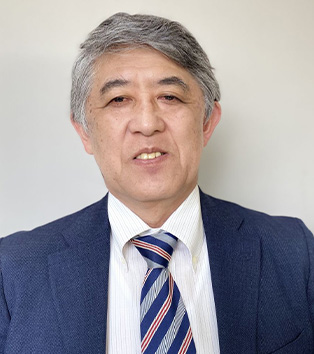Professional in Asian Countries
Through the Asian Satellite Campuses Institute (ASCI), Nagoya University is offering special research-based doctoral programs which primarily target professionals in government positions, and academic institutions from select Asian countries who have already completed a master’s degree and wish to earn a doctoral degree. This is a doctoral program which provides an opportunity for participants to deepen their knowledge and experience and work towards a doctoral degree through Nagoya University without having to take time out from their career. The program is designed to meet the needs of the evolving and dynamic Asian region.

- Close research supervision by academic advisors and other main campus support staff
- Regular tuition via cutting edge distance education and communication tools
- In-country academic and technical support
- Short-term intensive academic seminars at main campus in Japan
- ASCI has been established to implement the Transnational Doctoral Programs for Leading Professionals in Asian Countries initiative in select countries. As of 2024, six satellite campuses have been opened across Asia and seven Nagoya University graduate schools offer doctoral degree programs.
- Through the extensive use of technology and our dedicated staff, ASCI forms the essential link between the Transnational Doctoral students and Nagoya University's main campus.
- Given the competitive nature of the Transnational Doctoral Program, eligible candidates should be early to mid-career government officials and professionals who are aiming for leadership positions in their respective countries.
| Fields of the programs | Degree | Course term | |
|---|---|---|---|
| Graduate School of Education and Human Development | Educational sciences, psychology and developmental sciences |
Doctor of Philosophy (Education) Doctor of Education Doctor of Philosophy (Philosophy) |
3 years |
| Graduate School of Law | Legal institution design | Doctor of Laws (Comparative Law) | 3 years |
| Graduate School of Medicine | Healthcare administration | Doctor of Philosophy (Medical Science) | 4 years |
| Graduate School of Engineering | Civil and environmental engineering | Doctor of Engineering | 3 years |
| Graduate School of Bioagricultural Sciences | Agricultural sciences, life sciences, agricultural development | Doctor of Agricultural Science | 3 years |
| Graduate School of International Development | Economic and social development | Doctor of Philosophy (International Development) | 3 years |
| Graduate School of Environmental Studies | Earth and environmental sciences Environmental engineering and architecture Social and human environment |
Doctor of Environmental Studies (Sience) Doctor of Environmental Studies (Engineering/ Architecture) Doctor of Environmental Studies (Economics/ Laws/ Sociology/ Geography) |
3 years |
- Students wil be fully exempted from admission fees and tuition fees for the standard duration of the Program.
- Nagoya University will cover the cost of an economy-class airfare (return), accommodation, and living expenses during a student's annual visit to Japan.

Nagoya University established the Asian Satellite Campuses Institute in 2014. To date, over 100 students from government agencies, research institutions, and universities in eight countries (Vietnam, Mongolia, Cambodia, Laos, the Philippines, Uzbekistan, Afghanistan, and Kyrgyzstan) have enrolled in the doctoral programs of six research fields (Education Development, Law, Medicine, Life Agricultural Sciences, International Development, and Environmental Studies), with over 40 students graduating and obtaining their doctoral degrees. Additionally, starting from 2024, the School of Engineering will also participate in this program. Throughout this process, we have implemented online education and research guidance from the outset, demonstrating the effectiveness of a combination of online and face-to-face instruction tailored to the needs of each field.
In terms of research, collaborative research guidance with Asian scholars and educators has led to high-quality and original research results that are unparalleled and have the potential to further develop as part of the Tokai National University System's efforts. Specifically, unique research that can only be conducted in Asia has progressed, emphasizing the importance of tackling societal challenges unique to each country. Students in this program enter with significant knowledge and awareness of important societal issues in their respective countries, allowing them to delve into these challenges alongside Asian researchers and students and publish their findings in international academic journals as collaborative international papers, disseminating them as globally accessible information for researchers worldwide. The research topics addressed in these doctoral studies continue to evolve into new research aimed at solving these challenges, even immediately after graduation, through ongoing collaboration between graduates and supervising faculty.
In this way, the program has entered a new phase of planning and implementing joint research and projects as equal partners with its graduates, based on the cultivation of doctoral students and their contributions as equal partners, while also harmonizing with the university's internationalization efforts. Considering these achievements, scholarships from international organizations are being established for students studying at Nagoya University's satellite campuses. Thus, it is crucial to further develop the environment and relationships for those who wish to study at the university, building upon the trust and relationships that have been established over a long period with significant effort. The Asian Satellite Campuses Institute is committed to strengthening Nagoya University's role as a hub in Asia and further contributing to its internationalization efforts. Your support is greatly appreciated.
ASCI Director Akira Yamauchi